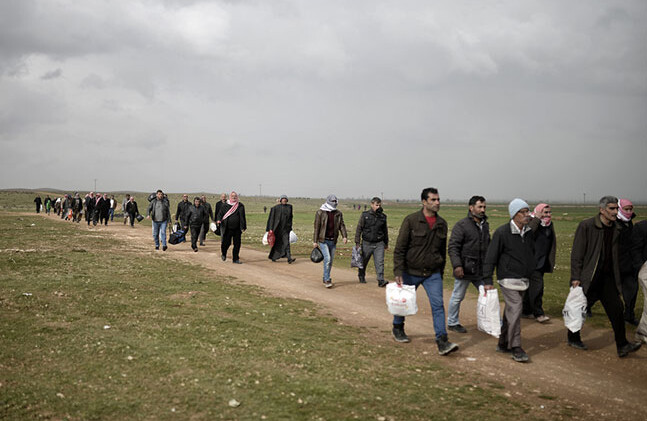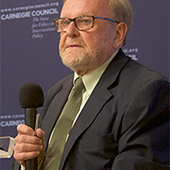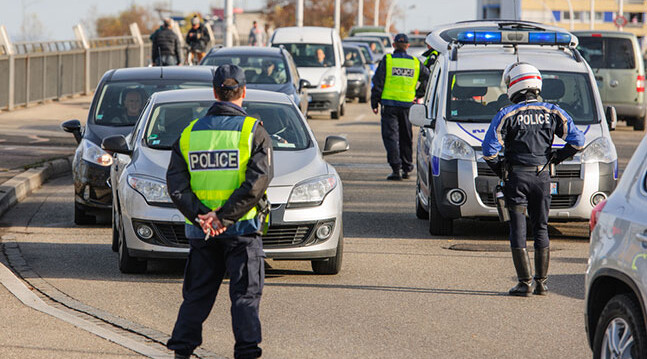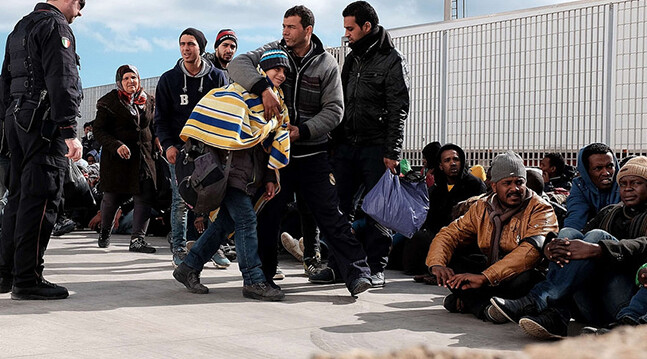This was to be, and will be, an article on the crisis of the growing refugee influx from Syria, Iraq, and beyond into Europe. It was to begin with a quote from the former foreign minister of Germany, Joschka Fischer: "[EU inaction on refugees] has created a legitimacy vacuum that xenophobic populists are now filling." This is still most certainly the case, but the appalling attacks on Paris on November 13 have made the refugee crisis a secondary story—temporarily, to be sure—on the front pages of the Western press and added fuel to the fire of ultranationalist populism. Most immediately, there is the claim that one of the ISIL perpetrators had been granted asylum in France, although what may be more to the point is that France has the highest number of recruits to ISIL among European nations. So the longer-term concern is not that one among the host of legitimate refugees may turn out to be a terrorist, but the home-grown threat from the down-and-out banlieues of Paris and across France.
Efforts to Control the Refugee Flow
On November 11-12, just before ISIL's deadly and devastating terror attacks in Paris, EU member states held a summit in Malta, attempting to come to agreement on quotas, processing protocols, and resettlement policies to cope with the complex and overwhelming refugee crisis. In early November, the International Organization for Migration estimated that more than 750,000 migrants had come to Europe by sea in 2015. The majority came from Syria, but people from Afghanistan and Kosovo came in second and third respectively.
Some European countries reacted by building walls. Hungary put up a barbed wire fence along its border with Serbia, and is extending the fence to protect its border with Croatia. Bulgaria is constructing a fence on its border with Turkey, and Greece's fence on the Turkish border made headlines as protestors demanded it be torn down so that refugees, whose attempts to travel by sea have resulted in more than 3,000 deaths, can travel to Europe by land instead. Slovenia is building a fence to protect its border with Croatia, and on November 11, Austria began building a fence along parts of its border with Slovenia. This obstacle is particularly noteworthy, and cause for celebration for the far-right Eurosceptics, as it is within the ostensibly border-free Schengen Area. The Schengen area, which allows for free movement within the European Union, is a defining principle, and a source of pride, for the EU. But as walls are built and passport checkpoints erected, many are questioning Schengen's ability to survive. At the Malta summit on November 12, a day before the Paris attacks, European Council President Donald Tusk declared, "Let there be no doubt: the future of Schengen is at stake, and time is running out."
The result of the Malta summit meeting was that European leaders agreed to a number of measures with Turkey regarding the estimated 2 million refugees in its overloaded camps. In addition to a cash settlement of 3 billion Euros from the EU itself and from individual member states, in what European Council President Donald Tusk described as "a mutually beneficial relationship," the EU agreed to reopen talks on Turkish membership and to consider making available EU-wide visas to Turkish citizens—the quid pro quo understanding being, of course, Turkey's cooperation in restricting the number of refugees crossing into Europe. A summit in late November or December is planned for finalizing the details, but, again, given the sheer numbers and stakes for refugees involved, it is, to say the least, doubtful that the northern tide into Europe will be significantly stemmed.
Barricading Borders does not Work
Following the attacks in Paris, knee-jerk reactions to seal up borders may become the norm, regardless of whether or not this security strategy is likely to curb terror attacks. European countries are tightening their border controls, and more than half of America's state governors have released statements saying they would not accept Syrian refugees—despite the fact that the federal government holds decision-making power regarding who can or cannot enter the country. Quite apart from the red herring of security of borders, there is a profoundly ethical issue inherent in our democratic polity: "Give me your tired, your poor, your huddled masses yearning to breathe free" defines who we are, or should be.
Closing borders in the West will not only worsen the already unimaginable human rights disaster that asylum seekers are facing, but it will also add fuel to the Eurosceptics' fire as they work to destabilize the European Union. And this is all compounded by the fact that closing borders doesn't work. Of the 745,000 refugees resettled in the United States following September 11, 2001, not one has been arrested for domestic terrorism charges. Two were arrested for aiding al-Qaeda in Iraq, but experts still say refugee resettlement is "the least likely route for potential terrorists."
Carnegie Council Global Ethics Fellow Kavitha Rajagopalan writes about the failures of using anti-immigration policy as a counterterrorism strategy: "Since September 11, 2001, both the U.S. and Europe have merged anti-terrorism strategies with immigration policy, and with little success. Increased surveillance of immigrant communities has failed to generate terror leads or cases…[these policies] are not actually keeping anyone safe from terrorist attacks. In fact, not only has the so-called securitization of migration policies been ineffective, they've created problems we do not want: they have broken the trust between immigrant communities and their governments and contributed to a growing international humanitarian crisis of migrant deaths."
Additionally, blaming immigrants is short sighted, as is formulating policy based on one suspected, yet unconfirmed, potential attacker who may or may not have claimed to be a Syrian refugee. As political sociologist Durukan Kuzu wrote, "The route taken into France by one of these attackers is less of an issue than the route taken out by many more disillusioned citizens. France has marginalised its Muslim youth and some, as a result, have decided to join IS and return to kill." In fact, an estimated 1,450 French nationals have left France to join ISIL, the highest number of any European country.
Pressure on Political Leaders will Increase
These facts notwithstanding, there will be increased political pressure on European heads of state to tighten, if not reverse, the policies of welcoming refugees—where such policies are in place. The obvious example is Germany, where Federal Chancellor Angela Merkel justified a welcoming policy with the statesmanlike "We can manage this," even in the context of the largest influx by far of some 330,000 refugees to date. This steadfastly humanitarian approach came under fire even before the Paris killings: in an extraordinary challenge to his own leader, German finance minister Wolfgang Schauble warned of an "avalanche" of refugees, triggered by "careless" actions (quite clearly, the "actions" he refers to are those of Merkel herself). The very future of the once seemingly impregnable chancellor is deemed to be in doubt.
Others, such as Prime Minister David Cameron in the United Kingdom, will feel increased pressure from the political right, as will most obviously President Hollande in France, while Paris will be invoked to justify the xenophobia driving anti-refugee impulses in leaders such as Prime Minister Orban of Hungary.
In addition, what will surely eventuate is a right-wing backlash—beginning with, but not restricted to, Marine le Pen's Front Nationale, along the lines of "we told you so," with respect to opening Europe's borders to those seeking sanctuary from the bloody and prolonged conflicts of the Middle East.
In sum: The refugee crisis will persist, indefinitely; there will be ongoing debate within the EU and member states as to border controls, numbers that are acceptable, and processes and timetables for admitting the refugees. One thing, however, to bear in mind above all other considerations is that those asylum seekers from Syria and Iraq are fleeing precisely the kind of nightmare etched indelibly on our minds from Paris on November 13. For that reason alone, there is a need for the 28 individual EU country "policies" to become one coherent, humanitarian strategy.
Earlier this year, a Council-commissioned, edited volume on the European Far Right was published. In chronicling the growth of extremist, ultranationalist movements across Europe—including France—the anti-immigrant animus in general looms large. For further study, see Eurasianism and the European Far Right edited by Marlene Laruelle, Lexington Books 2015.




